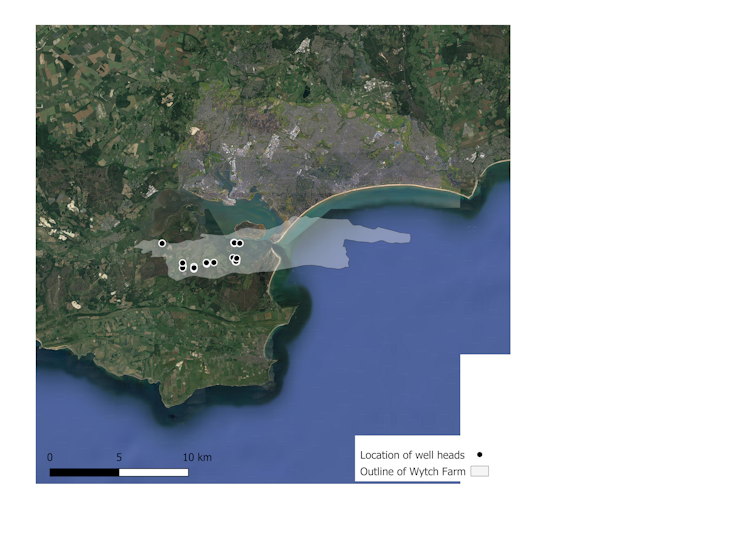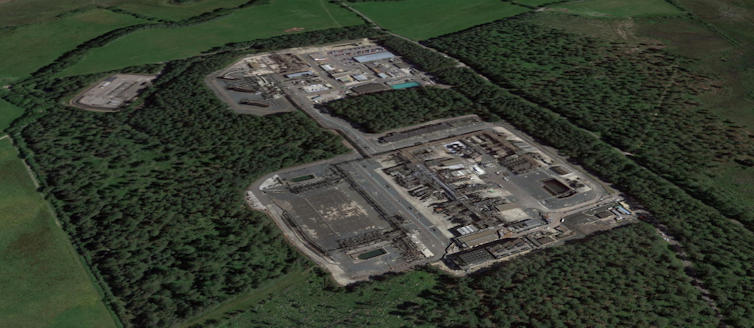Conversation: Poole oil spill expert
Expert Q&A: why is there an oil field in Dorset anyway?
Published on: 29 March 2023
The Conversation asked oil industry expert Dr Mark Ireland to explain why there is an oil field in Dorset, what sort of oil it produces, and what happens next.
A major incident has been declared after a leaky pipeline caused 200 barrels of oil “reservoir fluid” to spill into Poole Harbour in Dorset, south-west England. The oil was being transported from nearby Wytch Farm, which hosts western Europe’s largest onshore oil field.
We asked oil industry expert Mark Ireland of Newcastle University to explain why there is an oil field in Dorset, what sort of oil it produces, and what happens next.
Why is there an oil field in Dorset anyway?
The oil is mostly found about 1,500 metres below the surface within Sherwood Sandstone, a common rock in Britain which was deposited in the Triassic period.
The oil field is often referred to as an “onshore” field but actually extends from just to the west of Wareham (onshore), to the east out beneath Poole Harbour and Bay.

Exploration for oil in the area can be traced back to 1935, with the nearby Kimmeridge Field discovered in 1959. The first oil was produced from Wytch Farm in 1979.
How is the oil extracted?
More than 200 production wells have been drilled at Wytch Farm over the years, most using a technique known as extended reach drilling. Extended reach drilling makes use of directional drilling, which enables the direction and deviation of a well towards a target that is not immediately below the drilling pad.
In the case of Wytch Farm, this has enabled multiple wells to be drilled from single locations. This enabled the previous operators and now the current operators Perenco to reach the oil beneath Poole Harbour, which otherwise would have been inaccessible due to the environmentally sensitive nature of the harbour and surrounding wetlands.
Sea water has been injected into the rocks to maintain pressure and ensure more oil flows out, a common practice in many late life oil fields.
How much is there and when will it run out?
Wytch Farm has been estimated to have somewhere between 700 million and 900 million barrels originally in place. Of this, about half will be extracted.
At its peak in 1999, it produced almost 100,000 barrels of oil per day, but currently it produces around 14,000 barrels per day. Wytch Farm is a “late life” field, which means production is in decline and this is likely to continue.
This oil is extracted along with large volumes of water, and typically the oil to water ratio decreases during a field’s life. That’s why the 200 barrels of reservoir fluid in the latest leak are reportedly 15% oil and 85% water.
The current operators proposed in 2016 to extend the production of the oilfield out to 2037. Wytch Farm currently provides about 1% of the UK’s crude oil demand, although accounts for more than 75% of the production from “onshore” fields. When the field does reach its end of life, it could cost around £150 million to decommission.
Why haven’t I heard of this before?
Part of the answer is that it’s simply not very visible compared to many other large industrial developments. Wytch Farm has found itself used by the onshore oil and gas industry as an example of how onshore oil and gas can have only a minor visual impact thanks to technology and engineering solutions, for example both well heads and the gathering station are nestled within forested areas.

Is this sort of oil field safe? How could we make sure there are no more spills like this?
As with all oil and gas operations there are hazards and risks. Developments consist of not just the wells, but also surface infrastructure to transport the produced fluids, and processing facilities. In Poole harbour, the leak reportedly occurred from a pipeline.
No further details have yet been provided, but it seems likely that this is related to one of several pipelines which connect the well heads, for example located on Furzey Island, to the main gathering station onshore.
It is unlikely that the oil and gas sector will ever be able to 100% rule out spills and leaks, particularly where there is ageing infrastructure. However specifically in the case of leaks from pipes, the industry has continued to look at ways to monitor pipelines and mitigate the likelihood of leaks. For example, companies are now using underwater remotely operated vehicles to inspect underwater pipelines.
Whose fault is this leak and whose responsibility is it to clean up?
Ultimately the company that operates the pipeline is responsible for ensuring that it is maintained. From the operator’s perspective, the UK government operates a dedicated incident reporting service that companies must use to report any release of oil or chemicals to the sea.
Perenco has said its “incident management team was activated immediately, the leak was stopped and booms deployed as an additional containment to protect Poole harbour. Perenco UK is working closely with the relevant authorities and a clean-up operation is under way.” The company has promised a full investigation to ascertain what happened.
In the case of Poole, the local Harbour Commissioners is the regulator responsible for coordinating the cleanup.
While initially the costs may be incurred by those coordinating the response, oil and gas producers who operate on the UK continental shelf are party to a voluntary agreement. This sees them take financial responsibility for any discharges of oil that occur as a result of exploration or production, and that any remedial measures are promptly reimbursed.
At this stage the focus is on the clear up, but the UK has in place the necessary legal framework to ensure that the financial responsibility is apportioned appropriately.
Mark Ireland, Lecturer in Energy Geoscience, Newcastle University
This article is republished from The Conversation under a Creative Commons license. Read the original article.



